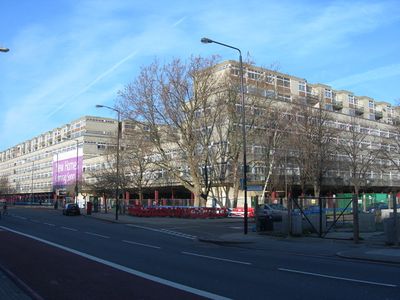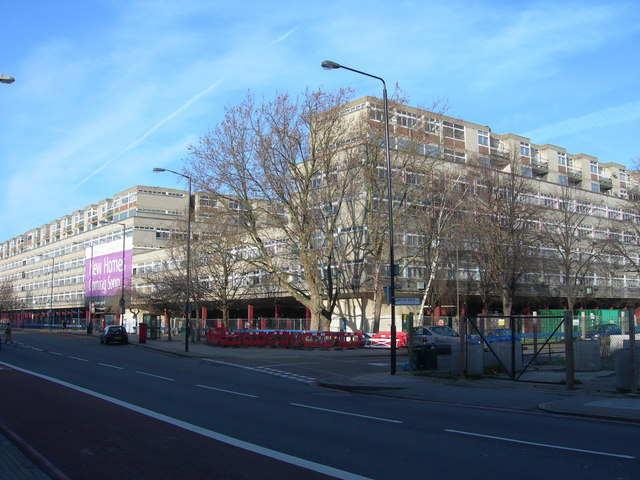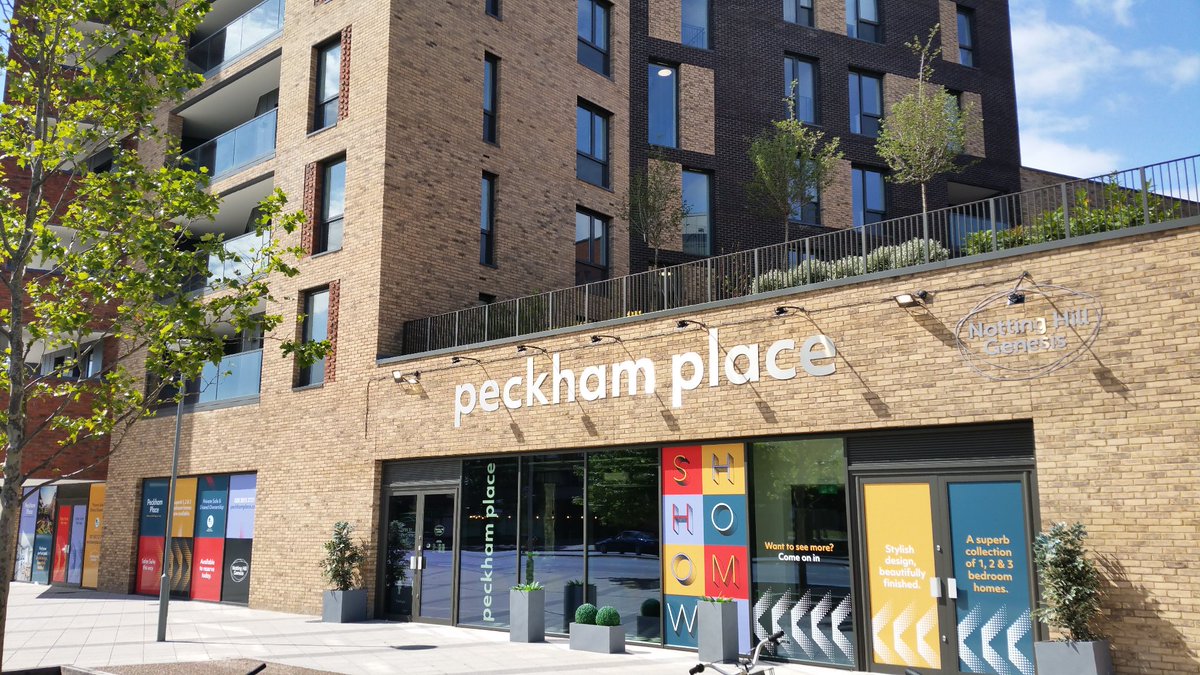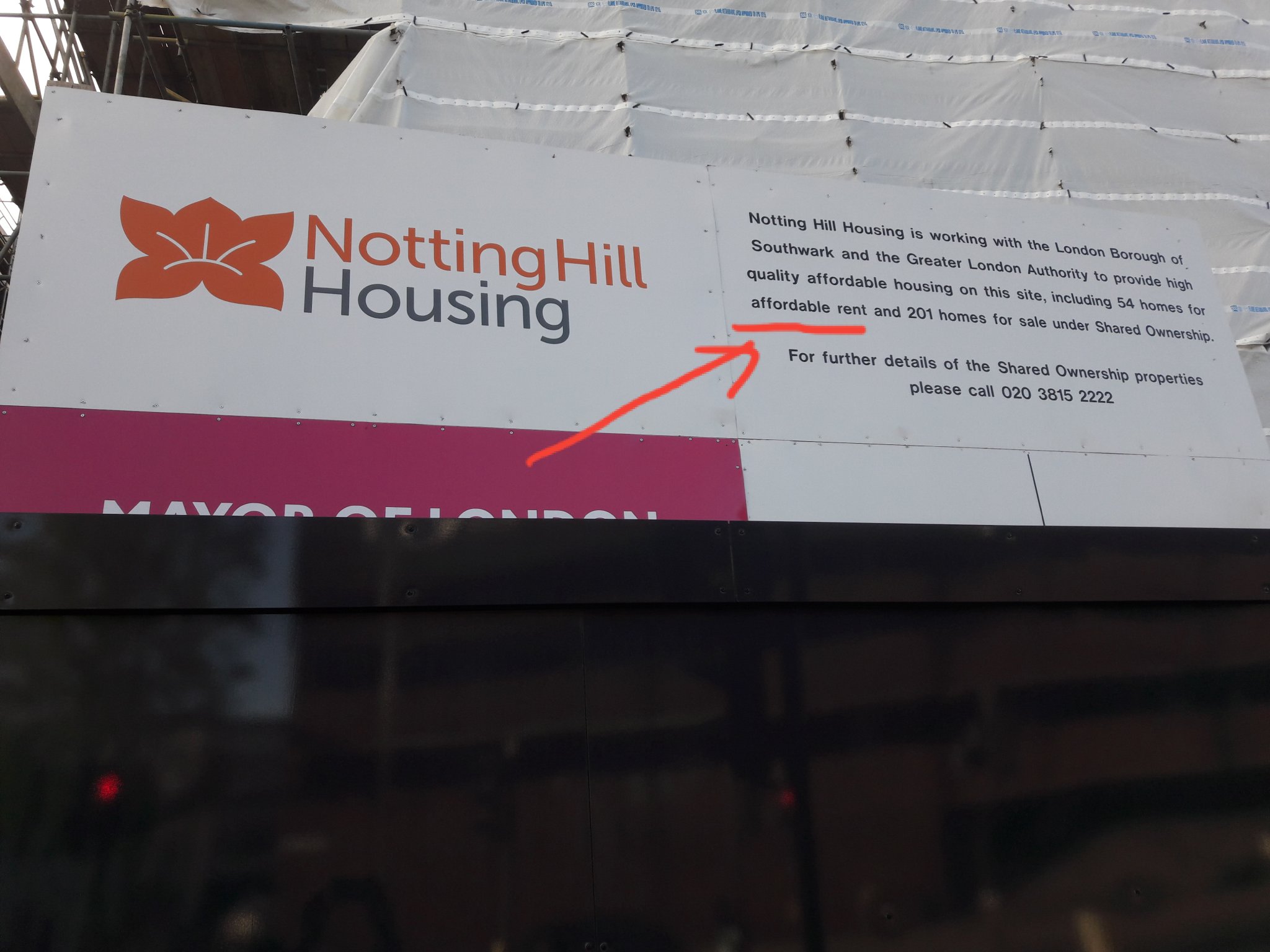
People Before Profit and Southwark Defend Council Housing (SDCH) are mounting a protest against empty homes in Southwark with a demonstration at Peckham Place 12pm Saturday the 31 October.
The demo is to highlight the number of empty homes in the borough and takes place at a critical time for London’s homeless people, who enjoyed some respite from their plight during the Covid lockdown, when they were housed in the capital’s empty hotels. Charities are warning homeless people's lives will be lost this winter unless action is taken.
People before Profit and SDCH are demanding that empty homes are requisitioned for the homeless. It will be the third demo highlighting the issue, after demos at Maydew House and Elephant Park, formerly the Heygate estate - see #RequistionEmptyHomes.

Wood Dene council homes that were lost
The new Peckham Place development replaced the Wood Dene estate, which had 323 council homes before it was demolished in 2007 as part of the Southwark Estates Initiative, a regeneration strategy devised by Southwark Council’s as part of New Labour’s ‘Urban Task Force’ renewal strategy. None of the council homes have been replaced.
Peckham Place has had a tortuous development history, related on our Wood Dene regeneration webpage. Southwark decided to demolish Wood Dene back in 2000 and the Presentation housing association were adopted by Southwark as the site’s developer in 2002 [^1]. In 2005 Presentation’s ‘preferred’ proposal was for a development of 216 units, half to be social rented, half to be intermediate [^2] But Presentation were taken over by Notting Housing Trust (NHHT) in 2009 and it was NHHT who eventually secured planning permission for the redevelopment, in 2013.

Despite being a housing association, NHHT produced a viability assessment that claimed that only 63 shared ownership and 54 social rent units could be built (alongside 216 private units) – a net loss of 197 affordable homes according to the GLA [^3], compared to the council homes on Wood Dene. By the time Peckham Place was completed in late 2019, there were 54 ‘affordable rent’, and 201 homes for shared ownership, according to an onsite billboard, leaving 78 for private sale.

What happened to the Wood Dene residents?
Southwark stopped issuing secure council tenancies on Wood Dene in May 2002, but there were 289 households to be decanted in July 2003, with 173 wishing to return to new homes on the redeveloped estate [^4]. Given that the work on the new homes did not begin until 2016, it seems that they were all bound to have been disappointed, despite a pledge that they would have a ‘right to return’. All but the 16 leaseholders would have been rehoused in current council housing stock, as long as they were secure tenants, not temporary tenants filling the voids created since May 2002.
Leaseholders would have received compensation for their homes at ‘market value’, but as leaseholders at the Heygate and Aylesbury estates found, it would not be sufficient for a free-market homes in the area, let alone anything on Peckham Place, where a two-bed home costs between £585k and £700k.
The cost of decanting the residents was estimated in 2003 to be £879,750, made up of home loss, and disturbance payments and leasehold acquisition [^5].
The cost of demolition
The rationale of the Southwark Estates Initiative and for demolishing Wood Dene was that the money from selling the land was needed to regenerate Southwark’s housing stock. The Council’s Executive committee, as it then was, was toldin 2005;
“It is estimated that the sale of the site will generate £6.9 million net to be recycled into the wider SEI programme, this figure is based on a valuation of the site completed in 1998. The cost of demolishing the block is estimated to cost in the region of £3.4m.”
When Southwark resolved in December 2005 on a Compulsory Purchase Order (CPO) for the sixteen Wood Dene leasehold properties Southwark stated further, that;
“Securing vacant possession and onward sale to the RSL [registered social landlord] will generate a substantial capital sum. The securing of this receipt is essential to the delivery of the Housing Investment Programme” [^6]
Despite being ‘essential’ for the Housing Investment Programme, the land was not sold until 8 years later, in December 2013, and for not much more than its 1998 valuation, to NHHT for only £7.05m.
Notting Hill in Southwark
As well as redeveloping the Wood Dene site, NHHT, or Notting Hill Genesis (NHG) as it became in 2018, has a big presence elsewhere in Southwark. NHG is development partner for the Canada Water development, where it is building 1030 homes across a range of tenures). Including 230 private rent units, through its Folio London subsidiary.
NHG is also the affordable housing provider on the Aylesbury regeneration, where it received a £210m bailout from Southwark, after Southwark took over the development of the First Development site, to build council homes.
When NHHT amalgamated with Genesis Housing in 2018, it did so amidst criticism that it had ‘lost their mission to meet housing needs among the low-income people in inner London..’ and like many big housing associations has moved away from solely providing social rented housing, to building shared-ownership and free market homes. In 2019/20 only 720 of the 1,900 plus homes completed by NHG were ‘low-cost rent’.
An object lesson
The story of Wood Dene is an object lesson in how estate regenerations go wrong. Southwark persuaded itself that the estate’s land value justified demolition and that the money received could be used to improve other council housing stock. It then waited 8 years for that land receipt, which barely rose in value from the original estimate, while property prices rocketed. It displaced over 300 households and depended on a housing association that either could not or would not build enough social rented homes to replace the council homes lost. Instead we have the usual mix of ‘affordable’ housing, with just 54 ‘affordable rent’ units where there were once over 300 council homes.
PROTEST - Stop this horror story! - Fill these empty homes!
Footnotes [^1]: Wood Dene SEI decant arrangements 29th July 2003 para 2
Wood Dene Estate Regeneration Update 23 May 2005 para 12
[^2]: Wood Dene Estate Regeneration Update 23 May 2005 para 13
[^3]: Officer's Report Planning Committee 2 July 2013 pg 47
[^4]: Wood Dene Estate Regeneration Update 23 May 2005 para 7
Wood Dene SEI decant arrangements 29th July 2003 para 19
[^5]: Wood Dene SEI decant arrangements 29th July 2003 para 24
[^6]: Wood Dene Estate Regeneration Update 23 May 2005 para 11,
Compulsory Purchase of Lands on the Acorn Estate Peckham 13 December 2005 para 21